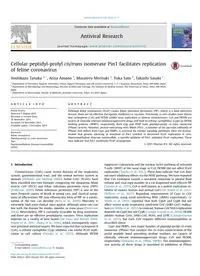
2016 Cellular peptidyl-prolyl cis_trans isomerase Pin1 facilitates replication of feline coronavirus PDF
Preview 2016 Cellular peptidyl-prolyl cis_trans isomerase Pin1 facilitates replication of feline coronavirus
Cellular peptidyl-prolyl cis/trans isomerase Pin1 facilitates replication of feline coronavirus Yoshikazu Tanaka a, *, Arisa Amano a, Masateru Morisaki a, Yuka Sato b, Takashi Sasaki c a Department of Veterinary Hygiene, Veterinary School, Nippon Veterinary and Life Science University, 1-7-1 Kyounan, Musashino, Tokyo 180-8602, Japan b Department of Microbiology and Immunology, Division of Molecular Virology, The Institute of Medical Science, The University of Tokyo, Tokyo 108-8639, Japan c Department of Bacteriology, Faculty of Medicine, Juntendo University, Tokyo 113-8421, Japan a r t i c l e i n f o Article history: Received 5 August 2015 Received in revised form 18 November 2015 Accepted 29 November 2015 Available online 7 December 2015 Keywords: Feline coronavirus Peptidyl-prolyl cis-trans isomerase Pin1 Dipentamethylene thiuram monosulfide (DTM) a b s t r a c t Although feline coronavirus (FCoV) causes feline infectious peritonitis (FIP), which is a fatal infectious disease, there are no effective therapeutic medicines or vaccines. Previously, in vitro studies have shown that cyclosporin (CsA) and FK506 inhibit virus replication in diverse coronaviruses. CsA and FK506 are targets of clinically relevant immunosuppressive drugs and bind to cellular cyclophilins (Cyps) or FK506 binding proteins (FKBPs), respectively. Both Cyp and FKBP have peptidyl-prolyl cis-trans isomerase (PPIase) activity. However, protein interacting with NIMA (Pin1), a member of the parvulin subfamily of PPIases that differs from Cyps and FKBPs, is essential for various signaling pathways. Here we demon- strated that genetic silencing or knockout of Pin1 resulted in decreased FCoV replication in vitro. Dipentamethylene thiuram monosulfide, a specific inhibitor of Pin1, inhibited FCoV replication. These data indicate that Pin1 modulates FCoV propagation. © 2015 Elsevier B.V. All rights reserved. 1. Introduction Coronaviruses (CoVs) cause severe diseases of the respiratory system, gastrointestinal tract, and the central nervous system in animals (Perlman and Netland, 2009). Feline CoVs (FCoVs) have been classified into two biotypes comprising the ubiquitous feline enteric CoV (FECV) and feline infectious peritonitis virus (FIPV) (Pedersen, 2009). Feline infectious peritonitis (FIP) is one of the most frequent causes of death in young cats, and classical symp- toms of effusive/wet FIP, non-effusive/dry form of FIP, or a combi- nation of the two can develop (Berg et al., 2005). Mortality is extremely high once clinical signs appear, although some cats can live with the disease for weeks, months, or even years (Pedersen, 2014). Nevertheless, FIP is currently incurable by drug treatment, and there are no effective prophylactic vaccines. Virus replication depends on a variety of host factors (de Haan and Rottier, 2006; Vogels et al., 2011; Zhang et al., 2010), which consequently repre- sent potential antiviral targets. We have reported that cyclosporin A (CsA), a cellular cyclophilin (Cyp) inhibitor, can inhibit FCoV repli- cation in cell culture (Tanaka et al., 2012). Although FK506 suppresses calcineurin and the nuclear factor pathway of activated T-cells (NFAT) at the same stage as CsA, FK506 did not affect FCoV replication (Tanaka et al., 2012). These data indicate that CsA does not exert inhibitory effects via the NFAT pathway. We have reported that CsA treatment caused a sustained reduction in pleural fluid volume and viral copy number in a cat diagnosed with effusive FIP (Tanaka et al., 2015). CsA is well known as a potent replication in- hibitor of various human and animal CoVs (de Wilde et al., 2013; Pfefferle et al., 2011). Regarding requirements of Cyps in CoV replication, using small interfering RNA (siRNA) experiments, de Wilde et al. (2011) reported that both CypA and CypB did not affect severe acute respiratory syndrome CoV (SARS-CoV) replica- tion (de Wilde et al., 2011). In contrast, human CoV NL63 replication depends on CypA but not CypB (Carbajo-Lozoya et al., 2014). FK506 inhibits human CoVs, SARS-CoV, NL63, and 229E (Carbajo-Lozoya et al., 2012), but each CoV requires different immunophilins as described above. Cyps and FKBPs, two major families of peptidyl-prolyl cis-trans isomerase (PPIase) that catalyze the cis-trans isomerization of the prolyl peptide bond preceding proline residues, are targets of clinically relevant immunosuppressive drugs, CsA and FK506, respectively (Siekierka et al., 1989a, 1989b). The immunosuppres- sive activity of these drugs is unrelated to inhibition of PPIase * Corresponding author. E-mail address:
